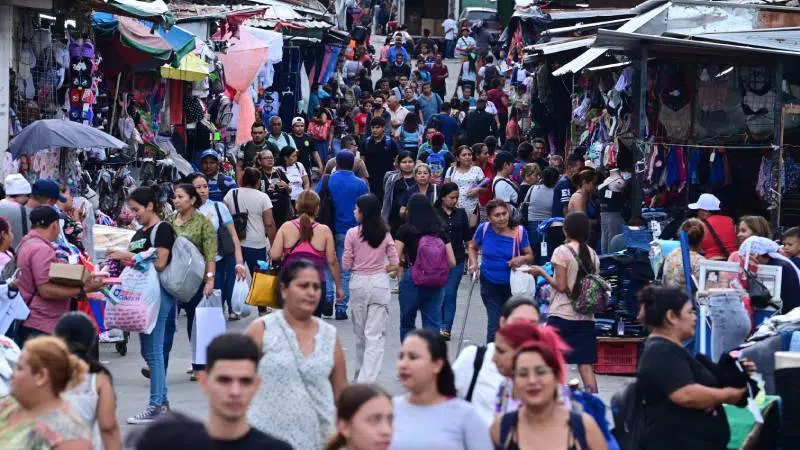The Economic Activity Index (IVAE) published by the Central Reserve Bank (BCR) grew 2.3% in February, two points higher than in January when it only reached 0.3%, but one point below February of last year when it exceeded 3.3%.
Of the nine activities measured by the indicator, only one showed a decrease of 5.45%: public administration and defense activities, education, health, and social assistance. Meanwhile, trade and transport grew only 0.92%, while agriculture, livestock, forestry, and fishing saw growth of 1.7%.
The activities with the highest growth were construction (11.3%), real estate activities (7.8%), and financial and insurance activities, which rose by 7.04%, compared to February 2023.
The industrial production index grew 2.38% and communications grew 2.32%, according to BCR data.
“The trend indicates that the economy is heading downwards, and the data is very complicated and imprecise,” says economist Otto Boris Rodríguez, who stresses that this is the first time only the public sector is negative while all other sectors are positive, whereas at the end of last year, “almost all were heading down.”
For the economist, despite growth in the indices, some sectors, like industry, remain below 2019 levels. In February 2019, it stood at 108.14, and this year in the same month, it reached 106.35.
Furthermore, Rodríguez believes the country’s economy will struggle to achieve the 2.5% growth projected by entities like the International Monetary Fund (IMF) and the Economic Commission for Latin America and the Caribbean (ECLAC); he thinks it might reach 1% “if the economy does not continue to deteriorate.” For the economist, this year’s economic conditions are more adverse than last year’s.
And this is due to the fiscal adjustment that began in the last quarter of last year and will continue throughout this year; the migration issue in the United States, which will affect remittances – even if they increase, it’s like savings being sent by migrants. Additionally, results from attracting foreign investment are not yet visible; “there is still an adverse environment; and besides, CECOT is being promoted more than investments,” says Rodríguez.
Actividad económica en El Salvador está creciendo menos que en 2024
El Índice de Actividad Económica (IVAE) que publicó el Banco Central de Reserva (BCR) creció en febrero 2.3%, dos puntos arriba que en enero que solo llegó al 0.3%, pero uno debajo de febrero del año pasado cuando superó el 3.3%.
De las nueve actividades que mide el indicador, solo una tuvo un decrecimiento de 5.45% y fue la de actividades de administración pública y defensa, enseñanza, salud y asistencia social; mientras que comercio y transporte solo creció 0.92%, mientras que agricultura, ganadería silvicultura y pesca tuvo un crecimiento de 1.7%.
Mientras que las actividades de mayor crecimiento fueron construcción (11.3%), actividades inmobiliarias (7.8%) y actividades financieras y seguros que tuvo un alza de 7.04%, versus febrero de 2024.
El índice de producción industrial creció 2.38% y comunicaciones 2.32%, indican los datos del BCR.
“La tendencia indica que la economía viene para abajo y están bien complicados los datos y poco precisos”, dice el economista Otto Boris Rodríguez, que recalca que es primera vez que solo el sector público está en negativo y todos los demás sectores en positivo cuando a finales del año pasado “casi todos venían para abajo”.
Para el economista a pesar de existir un crecimiento en los índices algunos sectores siguen aún debajo de 2019 como el caso de la industria. En febrero de 2019 estaba en 108.14 y este año en el mismo llegaba al 106.35.
Por otra parte, para Rodríguez difícilmente la economía del país logrará crecer lo que proyectan entidades como el Fondo Monetario Internacional (FMI) y la CEPAL que es 2.5%; cree que se podría llegar a un 1% “si la economía no se sigue deteriorando”. Para el economista, las condiciones de la economía de este año son más adversas que la del año pasado.
Y esto se debe al ajuste fiscal que inició en el último trimestre del año pasado y que continuará todo este año; el tema migratorio en Estados Unidos que va afectar las remesas, que aunque suban es como un ahorro que están enviando los migrantes. Además, la atracción de inversión extranjera no se ven aún resultados “hay todavía un entorno adverso; y además se está promocionando más el CECOT que las inversiones”, dice Rodríguez.

